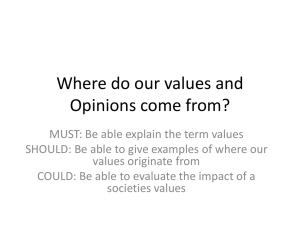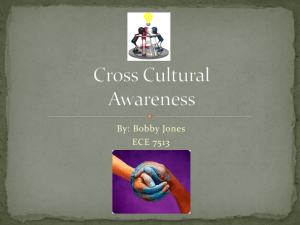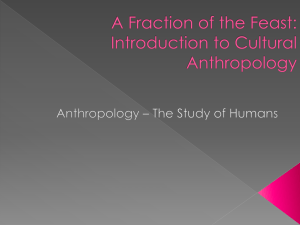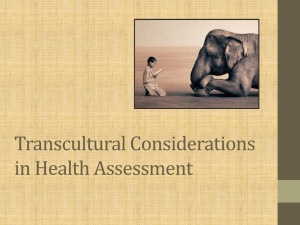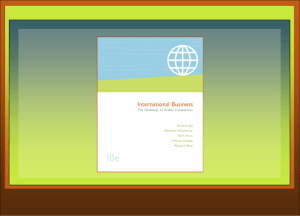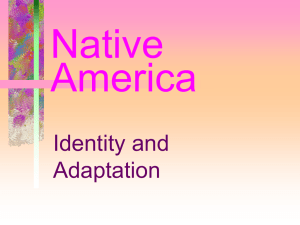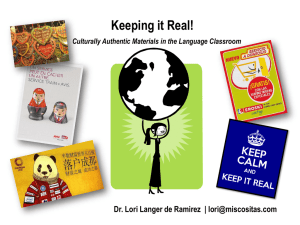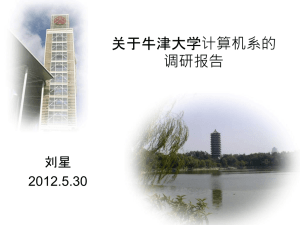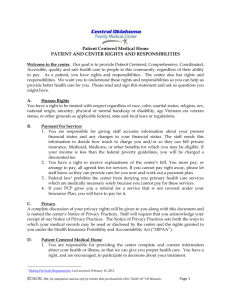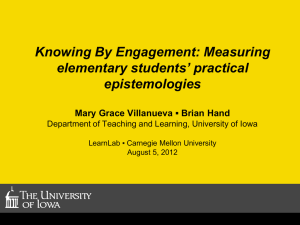Cultural Considerations When Working With Native American Families
advertisement
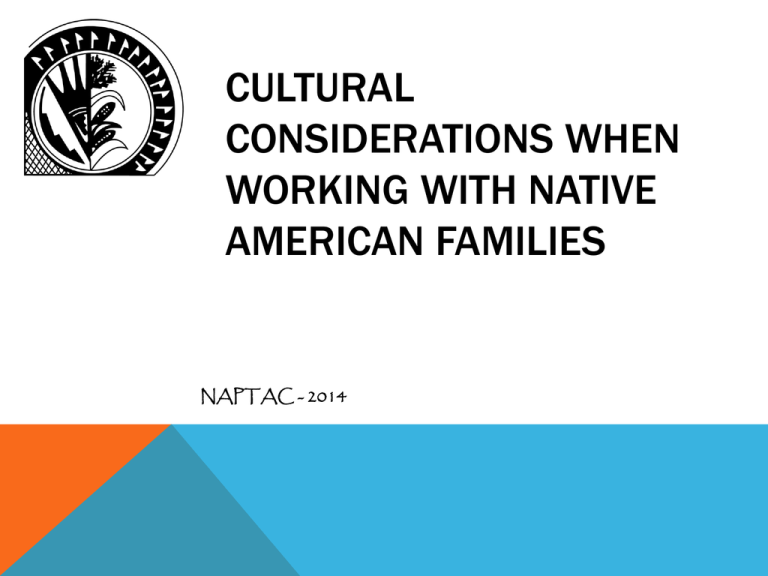
CULTURAL CONSIDERATIONS WHEN WORKING WITH NATIVE AMERICAN FAMILIES NAPTAC - 2014 INTRODUCTION The racial, ethnic, and cultural diversity of our nation continues to rapidly increase as we move into the next century. The growth of culturally distinct groups in the United States presents many challenges for health care, human services, and education professionals. Language differences are an obvious barrier to effective communication between families and provides. However, provides also encounter differences in family structures, values, beliefs, customs, and communication styles. To achieve healthy outcomes, providers must continually learn how to communicate and work with children and families of diverse cultures. CULTURAL BELIEFS AND VALUES • Members of a particular cultural group are not alike. Although people may share a common language, they may have very different origins, culture beliefs, and practices. • Acculturation is not always a linear process. Family members can be at different points in the cultural continuum at different points in their lives. Family values and practices may be more traditional with infants than with young adults. • Some families incorporate both cultures into their lives, using both modern educational beliefs and traditional beliefs of services. • Trust and respect with providers are vitally important for families from all cultural groups. Trust and respect are earned over time. FAMILY SPIRITUALITY • Providers should be careful not to make assumptions about a family’s religious or spiritual practice. • Providers need to acknowledge and support the spiritual or religious part of families’ lives. • Family privacy around religious or spiritual practices must be honored. FAMILY PRIVACY • Questions about ethnicity, financial information, education, living situations, and drug and alcohol use are too personal. Family members are concerned that they will be labeled as uneducated and poor because they are often stereotyped that way. • Many families who do not speak English are concerned about privacy and confidentiality when an interpreter is used. • Confidentiality is particularly important for families who live in traditional cultural communities where providers can easily share personal information with other staff without permission. FAMILY PRIVACY (CONTINUED) • It is important for educator and staff to learn about a culture’s communication protocols, or “who talks to whom about what.” It is also important to find out what kind of information is okay to share outside the family. • educators are aware that some of the questions they ask families are intrusive, but sometimes this information is needed to make a definitive diagnosis or to structure a educational plan. • Families who use traditional healers are asked a few questions but receive a great deal of guidance and support. INTERPRETERS • Interpreters may know a particular language, but may not be accepted and respected within the family, community, or culture. • Using children as interpreters is problematic. It reverses traditional authority, and children in many cultures are not supposed to talk about certain adult health information. • Using family members as interpreters can also cause problems because personal involvement with the family may result in serious internal conflict • Many concepts and words, especially Educational jargon, are not easily interpreted or translated into other languages. CONCEPTS OF FAMILY • Large families with many children are valued as wealth in many cultures. • Cultural traditions surrounding extended family continue even though family living conditions change. • It is important to ask the family who they would like to include. CONCEPTS OF TIME • Formal appointments are not a familiar concept for families. And may not be kept. • Work hours, family obligations, and spiritual practices can conflict with appointments. • Traditional healers will often see families without appointments. • Families will often take whatever time is needed to make decisions regarding their children. The decision –making process cannot be rushed. COMMUNICATION STYLES • The time taken for introductions and “small talk” shows respect. These are an essential part of establishing rapport and trust. • Communication may be indirect. • Families who speak limited or no English may hesitate to ask questions or admit they do not understand. • It is disrespectful to ask questions, request information, or disagree, particularly with an authority figure. • Honor, humility and privacy are important values in certain cultures. PERCEPTIONS OF ILLNESS AND DISABILITY • Health or developmental problems are kept private and treated within the family. The family may be discouraged from seeking help outside their own culture. • The medical system may be a second opinion or the last resort. • Families often use traditional herbal remedies instead of, or in combination with, western medicine. • Families want providers to respect their traditional healing methods. • All families from different cultures do not use traditional healing practices. • Providers should not ask a lot of questions about traditional healing practices. • There are many “costs” to families when they seek out western medical interventions, like conflicts with family members or traditional healing methods. CONFLICTING VALUES PROFESSIONAL SYSTEMS PLACE HIGH VALUE ON: • Facts rather than feelings and personal relationships • Impersonal communications • Formal appointments and strict timelines • Cost effective services • Speedy delivery of services FAMILIES FROM DIFFERENT C U LT URES P L AC E H I G H VA LUE ON: • Building personal, trusting relationships with providers as people, not systems • Sharing information through conversation, not documents • Appointments and schedules determined by family and cultural relationships • Family involvement in and support from the culture • Taking whatever time is needed to accomplish healing A.L.E.R.T. Accept: the family’s beliefs, values, and practices, even if you don’t agree; Learn: about the culture of the community and the individual families you serve, and remember to ask questions rather than assume; Explain: to families why you need information, why time and appointments are important, and how their child will benefit; Respect: the family’s cultural ideas, beliefs, values, and practices, find culturally appropriate ways to show respect; Train: and educate to enhance understanding. PRESENTER INFORMATION Judy Wiley Program Director Native American Parent Technical Assistance Center (NAPTAC) 1600 San Pedro Dr. NE Albuquerque, New Mexico 87110 (541) 210-4062 judy@epicsnm.org
